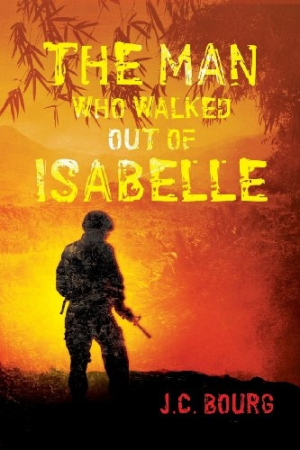The Man Who Walked Out Of Isabelle
Bourg’s debut is an accomplishment, a sensuous and bawdy celebration of rugged survivors in a threatening world.
J. C. Bourg’s first novel, The Man Who Walked Out Of Isabelle, is a compelling study of a remarkable character whose journey takes him from Hitler’s war machine to the jungles of Vietnam. Bourg’s senses are sharp, with a narrative full of timely, appropriate detail. His scenes are fully rendered as to setting, character, and the service of an intricate plot.
Max is a swashbuckling action hero who loves cold beer, fat cigars, and capable whores; he also has a casual, “better him than me” attitude about the fate of his adversary. A veteran of Hitler’s Wehrmacht, Max is now a legionnaire serving in the French army in Vietnam. He is one of few who survives when Dien Bien Phu is overrun by Viet Minh troops in 1954.
Bourg sets Max on a path to balance his capacity for lethal violence with an ability to bond with “the enemy of my enemy.” As a soldier, Max has learned the meaning of honor and loyalty—not toward the old causes he has grown to disavow (Fascism, colonialism), but toward the brotherhood of common soldiers around him. And after Dien Bien Phu, Max finds a new purpose in those same rugged mountains where he has been rescued.
Max certainly evolves throughout the novel, but Bourg’s attempt to humanize him is not entirely convincing. Readers may struggle to square the larger-than-life killing machine (“Death cannot find me…because I am death”) with his alter ego: a happily married family man, now integrated into civilized society. After decades of domesticity in Paris, Max returns to the mountains of Laos with the bloody machismo of a superhero for one last brutal mission, and he comes home with nary a bad dream.
If Max is not entirely believable, Bourg’s Vietnam rings dead-on. The action takes place in Saigon and in the north, including that corner of Southeast Asia’s opium-rich “Golden Triangle” that extends to Laos, where many Vietnamese refugees fled to escape war, corruption, and communist terror. Bourg skewers Western governments, “puppet” regimes, and the communist movements that rise up in opposition. Max sides with the struggling peasants and tribesmen, while local and global competitors vie for a share of the lucrative opium trade. Concurrently with Max’s story, Bourg follows Mei, who as a teen is sold into a brothel that services French troops. Always, Bourg uses representative characters and plot to dramatize events and ideas.
But The Man Who Walked Out Of Isabelle is a bumpy ride, grammatically. Readers will hesitate at a sentence such as this early one: “Max, a German in the unit comprised of foreign nationals reclined comfortably in the warm water.” Readers may not notice liberty taken with “comprised,” but the missing comma momentarily invites confusion. Punctuation and spelling errors (“there” and “their,” “two and “to”) are in abundance.
Despite its rough edges, this book is an accomplishment, a sensuous and bawdy celebration of rugged survivors in a threatening world.
Reviewed by
Joe Taylor
Disclosure: This article is not an endorsement, but a review. The publisher of this book provided free copies of the book and paid a small fee to have their book reviewed by a professional reviewer. Foreword Reviews and Clarion Reviews make no guarantee that the publisher will receive a positive review. Foreword Magazine, Inc. is disclosing this in accordance with the Federal Trade Commission’s 16 CFR, Part 255.

